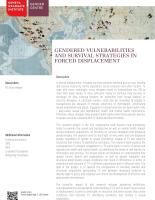Project Overview
The project was initiated in the Global Health Centre and was moved to the Gender Centre in September 2022.
Principal Investigator and Coordinator: Shirin Heidari
Research Team: Vinh-Kim Nguyen, Monica Adhiambo Onyango, Aida Essaid, Jinan Usta, Jane Freedman, Thanasis Tyrovolas
Research Assistants: Meriç Çağlar Chesley, Atwa Jaber, Shilan Masrour,
Past collaborators: Kaitlin Large
Funder: IDRC, SNIS
Period: 2019–2022
Partner Organisations: Université Paris 8, KMOP, HUG Programme santé migrants, Melissa Network, Praksis, Swiss Red Cross, UNFPA, UNHCR, American University of Beirut, Information and Research Center - King Hussein Foundation (IRCKHF)
Geographic Areas: Jordan, Lebanon, Turkey, Greece, France, Switzerland






